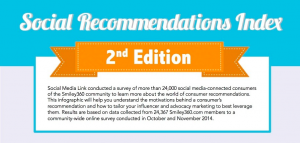 What inspires customers to recommend a brand on their personal social media profiles? What pushes them to natural, positive, and organic conversation – about you? These are the questions that drove researchers to survey “more than 24,000 social media-connected consumers.”
What inspires customers to recommend a brand on their personal social media profiles? What pushes them to natural, positive, and organic conversation – about you? These are the questions that drove researchers to survey “more than 24,000 social media-connected consumers.”
The infographic below, which includes many of their findings, will help any marketer or brand manager better understand the power of recommendations on social media. Learn how to tailor your influencer and advocacy marketing with the help of the data below.
Facebook: Most Trusted Social Network. Instagram: Least Trusted.
Seventy-one percent of survey respondents said that they are more likely to trust a product recommendation on Facebook than any other social network. Instagram, surprisingly, came in last place – only 38 percent of survey respondents most trust Instagram.
Instagram is by far the newest and fastest growing of all surveyed networks, which – by my guess – means two things. One, people are slow to trust what they don’t have a longstanding familiarity with. And, two, users are still coming around to the idea of seeing brands and products on Instagram. Monetization of this platform is still fairly new. (Remember, it wasn’t long ago when Instagram didn’t even allow hyperlinks in profiles.)
My prediction: Instagram trust-level will skyrocket in 2015.
Consumers Use Different Platforms At Various Stages In The Purchase Cycle
Fifty-three percent of respondents say they use Facebook and retailer websites to discover new brands and services. Fifty-six percent use the retailer’s website to research products they are interested in purchasing. Once the purchase has been made, 54 percent will use Facebook to share their product purchases. Not surprisingly, Instagram is the second most likely place for sharing a purchase.
Does The Fact That A Product Was Given For A Review Change Anything?
No, not much – depending on the situation. Eighty-eight percent of respondents said that they would trust a friend or family member who received a free product in exchange for a review. And 78 percent would trust a blogger who received a free product for a review. But once payment is included in exchange for the review, trust-level diminishes. (Only 48 percent of respondents would trust a blogger who was paid to review a product or service.)
What Makes A Review Or Recommendation Influential?
Consumers resonate with personal stories more than anything else. Whether those stories come from family members, close friends, or (on the other end of the “impact spectrum”) celebrities, personal stories SELL.
Trust On Social Media – The Infographic
Check out more findings in the infographic below. What surprises you? Any predictions of your own based on this data? Let’s talk in the comments section.

This article was syndicated from Business 2 Community: New Science Behind Trust And Recommendations On Social Media [Infographic]
More Digital & Social articles from Business 2 Community:





